If after watching "Miś" you came to the conclusion that the People's Republic of Poland was a madhouse - it means that you don't know much about Romania under the rule of Nicolae Ceaușescu. Because the achievements of Polish communists were nothing compared to the ideas that were bred in the mind of the "genius of the Carpathians".
As official propaganda proclaimed, Romania had to wait 2050 years for the "son of the sun" to walk on its land, "the builder of all that is good and beautiful", "the proudest fir of the country", "tribune of dignity", "great mast" - Nicolaeu Ceaușescu . This is how long it has been since the founding of the Daks, whose heiress was to be Romania. Its president is the incarnation of King Burebista. 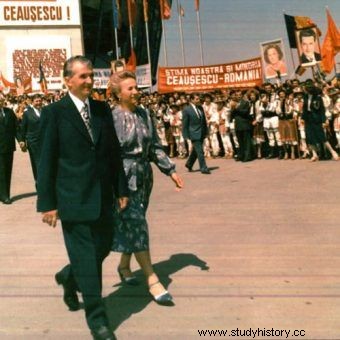
According to Thomas Kunze, author of Ceaușescu. Hell on Earth ”, the communist dignitary had something of a king about him - he exercised complete power and simply enjoyed luxury. But instead of splendor and regal majesty, vapors of absurdity wafted around him.
Litany to Ceaușescu
During a visit to China and North Korea, the "happiness strategist" was impressed by the cult of Mao Zedong and Kim Il-sung. Soon after returning from the Far East, the images of Ceaușescu looked at the Romanians from all sides.
The libraries were also filled with cavernous volumes of his speeches. And there was a lot to write down, because Ceaușescu could express his wisdom for up to five hours. Fortunately, the "sweetest kiss of the motherland" was given a little breath, and his tirades were interrupted with stormy and - of course - spontaneous applause.
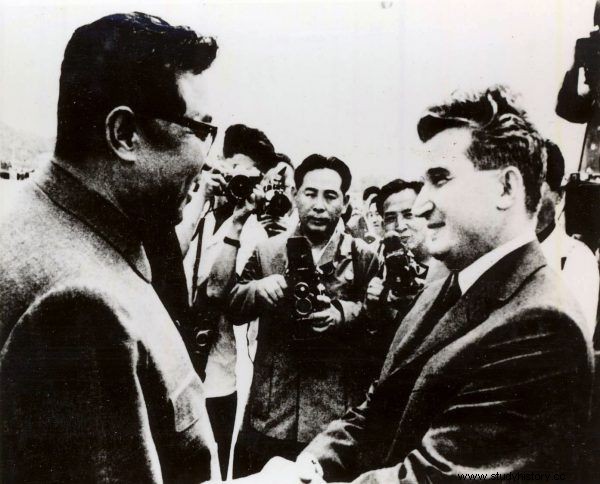
Ceauşescu came back fascinated and inspired from his trip to the Far East (source:Fototeca online a comunismului românesc).
There was a constant festival of success propaganda in the press, radio and television. In the late 1980s, when Romania's economic situation was so dire that, as a means of saving money, television broadcast only a two-hour program, the schedule consisted of news, broadcasts on Ceaușescu's theoretical work, poems and anthologies in his honor, and a documentary. Needless to say, to whom it was devoted.
So it is not known whether the fact that less than twenty percent of Romanians had a TV it was only due to poverty, or simply the majority of the population was aware of the pointless purchase of this device.
Clerical fate
The word minister comes from Latin and means servant and helper. This is how Ceaușescu understood them. According to him, an official should focus on serving the public and not dressing up in expensive suits.
More than once there were situations in which an ordinary chauffeur was mistaken for a minister . The latter preferred to be dressed like a slut so that only the "light of Romania" would not suspect him of laziness and not fulfilling his duties.
The officials, moreover, could not finish their work before Comrade President . Therefore, they stayed on standby until the lights in the most important office went out. Needless to say, most of the time they were doing completely pointless activities or wandering around the halls aimlessly.
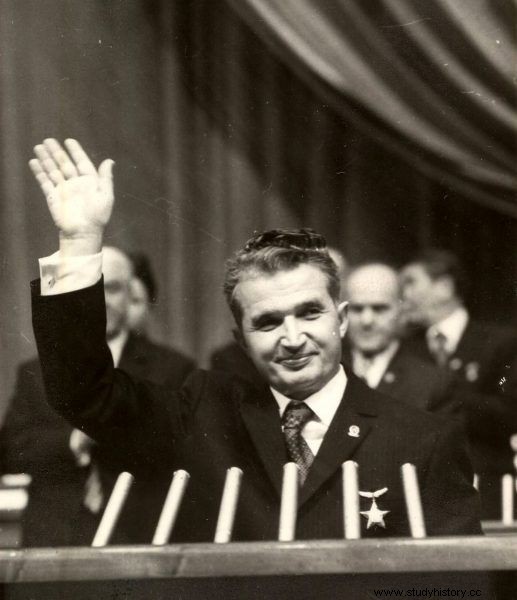
In Ceaușescu, officials could not finish their work until the lights went out in the leader's office (source:Fototeca online a comunismului românesc).
However, the greatest fear fell on the local dignitaries when they found out that it was their town that would be visited by "Jupiter Carpathians" himself. They not only had to spend a group of local kids to prepare a ceremonial academy in honor of the president and his wife, but also to fine-tune the overall appearance of the neighborhood.
Some resorted to spraying the trees with green paint, others hung handsome apples on the branches . When news came to local offices that Ceaușescu would be driving along the meadows, fallen cows were brought to them, chasing away emaciated and sick cattle.
Great Nicolae listens and watches
Ceaușescu absolutely wanted to control the life of every Romanian. That is why the whole country was covered by a dense network of wiretaps which were used against both party dignitaries and ordinary citizens. A word that was inadvertently spoken could have resulted in a shift to a less prominent position at best.
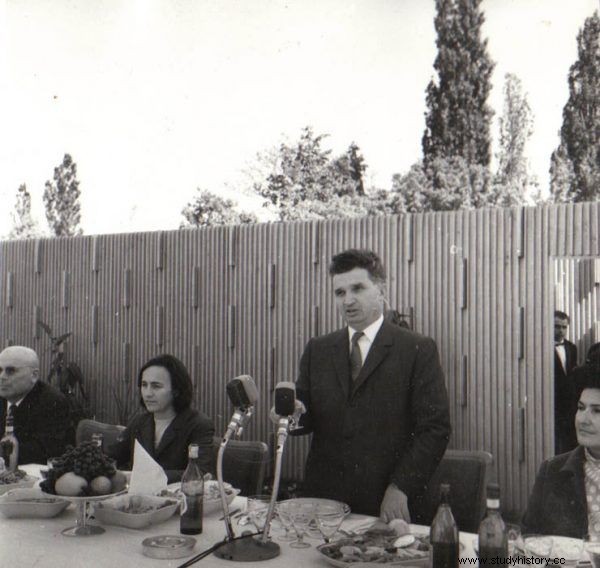
Ceaușescu's farm visits made officials fearful… (source:Fototeca online a comunismului românesc).
At worst - compulsory psychiatric treatment. After all, criticizing the best period in Romania's history, according to party activists and pseudo-doctors, was the best evidence of losing your mind. After such quarantine, many people who had not complained about their health before starting the "treatment" became human wrecks.
By wiretapping, it was also possible to track those who receive Radio Free Europe. Listening to a forbidden radio station - it was half the trouble. What about those who send anonymous letters to RWE, in which they allow themselves to undermine their leader's genius and spread rumors about alleged food shortages or turning off the heating in the middle of winter?
It was not a problem for the irreplaceable Securitate. At least, they thought so. From 1978, Romanian citizens were forced to obtain typewriter permits . In addition, special technicians took samples of fonts, on the basis of which the security services were to find out who was the author of the libel letters.
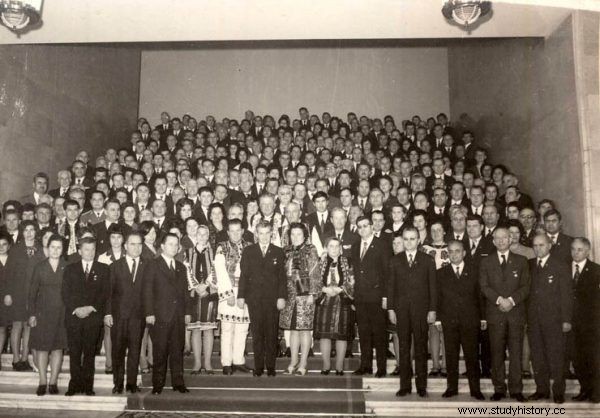
In the Ceaușescu state, everyone was in the circle of suspicion ... In the photo the 11th Congress of the Communist Party of Romania (source:Fototeca online a comunismului românesc).
Ceaușescu, however, saw in his genius that not everyone uses a typewriter. So it was decided to collect samples of the magazine regardless of whether they are children or adults. A really breakneck idea - if we take into account the size of the population and the lack of computer equipment that could compare such a huge database. It just couldn't work.
Don't talk to strangers
Of course, the greatest threat to the stabilization of the country were foreigners. It is true that Jews and Germans were treated as export goods and were allowed to leave for Israel or one of the German republics for a lot of money. However, it was necessary to limit the actions of foreign correspondents, students, clergy and other suspicious types.
For this purpose, a curious decree was issued that ordered Romanians to confess to the security services of every conversation with a foreigner . In order for such a conversation to take place at all, one had to first obtain the appropriate permission from the sad gentlemen.
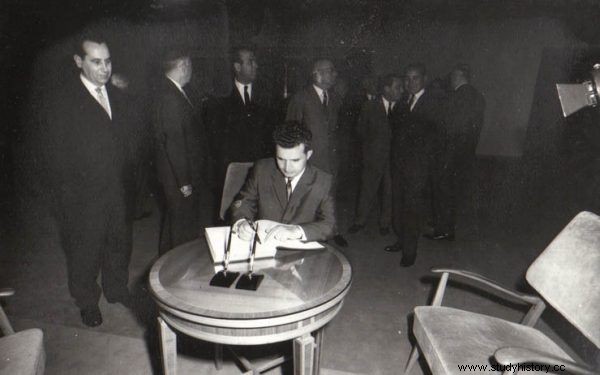
Ceaușescu wanted to personally decide about the lives of all Romanian citizens (source:Fototeca online a comunismului românesc).
However, it was not issued immediately. After all, life has its own rhythm, and administrative proceedings - its own. The situation was particularly grotesque when foreigners would come to a pre-arranged business meeting, but no one wanted to talk to them because the official permission had still not been issued.
Marriage with a foreigner was also out of the question until Ceaușescu himself agreed to it .
Great Builder
The submissive works in honor of the president could not be the only memento of the rule of "the steadfast defender of party unity as strong as granite". Buildings still had to be erected to emphasize Ceaușescu's invaluable contribution to the country's development.
The chairman of the Communist Party of Romania resumed work on the construction of the Danube-Black Sea Canal which were interrupted shortly after the death of Joseph Stalin. The work was stopped due to the difficult economic situation in the country.
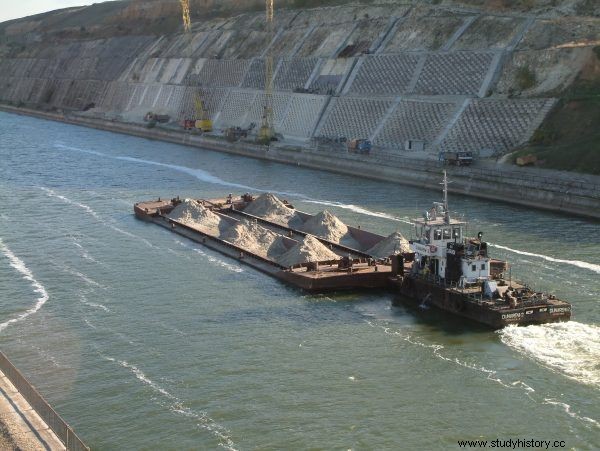
The investment that Ceausescu resumed in starving Romania will pay off in some 500 years! (public domain).
In the 1970s it was not so colorful that it was possible to decide to resume this investment. But who cares! Half a million prisoners, soldiers and construction workers were involved in the construction. The works were completed in 1987. According to some estimates, this investment will only pay off in 500 years.
Another example of megalomania or plain stupidity is the so-called People's House, which is located in the center of Bucharest. In order to make room for such an enormous structure, several districts were razed to the ground without even sparing the historic Văcăreşti Monastery and seventeen other churches. All this to create a juggernaut with an estimated construction cost of up to two billion dollars.
The works took place in three shifts, and the number of workers passing through the construction site amounted to two hundred thousand people. Everything was supervised by a team of 400 architects and two renowned specialists. The Ceaușescu couple looked after the construction site several times a day and their every suggestion became an order.
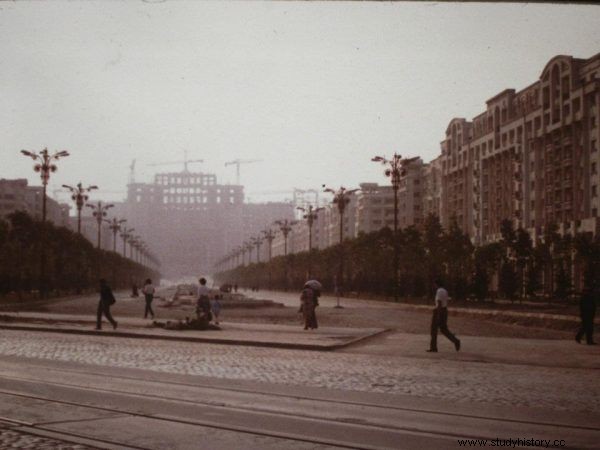
As Romania plunged into poverty, the Ceaușescu couple wondered where to add a marble staircase ... Pictured:People's House under construction (author:Scott Edelman, public domain).
Forge a marble staircase and move it to another location? - since it was said, it has to be done! This is another example of how disconnected Nicolae and Elena were from reality. While they were busy creating a palace with 7,000 rooms, average Romanians were going through a real school of survival.
Good national diet
In 1982, Ceaușescu decided to pay off all financial obligations without taking any more loans. And although he proudly announced that the country was debt-free in 1989, it had a tragic effect on the life of the entire society. Food was generally scarce which, similarly to the 1950s, began to be rationed, and products such as coffee and pepper became luxury goods. Empty store shelves filled with canned food, which was actually a disgusting slush.
Thomas Kunze in the book "Ceaușescu. Hell on Earth ”mentions the complete ignorance and contempt that communist dignitaries felt for society. The best example of this was the "Healthy Eating Program" , according to which, for one Romanian, among other things, 39.12 kilograms of meat per year were to be consumed.
It was a result and so difficult to achieve, because in stores there were mainly such delicacies as pig mouths, scraped pork ribs, chicken and goose heads - everything that could not be exported.
Apart from hunger, there were frequent shortages of electricity and gas. Central heating in large-panel blocks was turned off regularly, so put on jackets instead of pajamas . More factories were closed and entire families were left destitute.
Public transport was limited and passenger car traffic was based on registration numbers - one day cars with even numbers, the second with odd numbers.
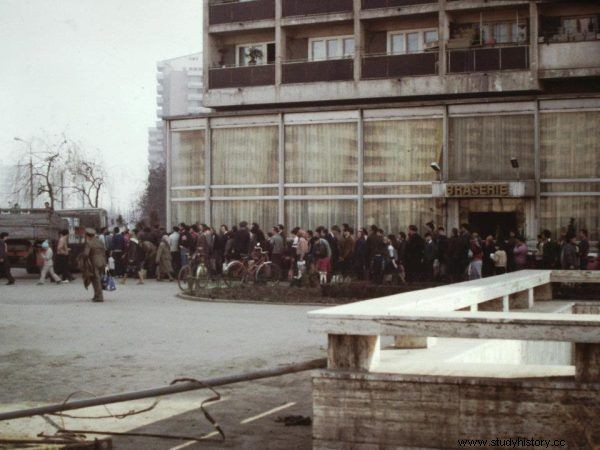
In the 1980s, literally everything was missing ... Pictured:queue for oil, Bucharest 1986 (author:Scott Edelman, public domain).
Savings covered every social group - even philharmonics. As recommended by the Party , each symphony orchestra had to fire a certain number of instrumentalists . When one of the conductors tried to save his orchestra by convincing the official that he could not fire some of the violinists, he was told in response that those who kept their jobs should play louder than usual.
The political orchestra led by Ceaușescu scattered as soon as she felt the wrath of the 1989 revolution. The "conductor" himself, before the bullets of the firing squad reached him, had already chanted the "International". This is how Europe's most bizarre dictatorship ended, the effects of which Romania is still feeling today.
Bibliography:
- Burakowski A., Genius of the Carpathians , Warsaw 2008.
- Kuczewski M., Romania. End of the golden age , Warsaw 2008.
- Kunze Thomas, Ceaușescu. Hell on Earth , trans. J. Czudec, Warsaw 2016.
- Pacepa I.M., Red Horizons , trans. M. Fabianowska, Warsaw 1990.
